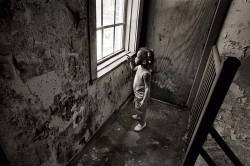"Twenty-five percent of very young children in America are living in poverty, according to an analysis of Census data released Thursday.
The number of children under six living in poverty rose to 5.9 million in 2010 from 5.7 million in 2009, researchers from the Carsey Institute at the University of New Hampshire found."
From The Huffington Post
We'll look at those numbers but first we need to know how they are calculated. Each year the Poverty Index is created from data collected by the census bureau and represents pre-tax cash income only. It does not include food stamps, housing assistance, etc. The poverty threshold represents the annual minimum cash income necessary to support individuals and families of various sizes.
According to the University of Michigan's National Poverty Center the poverty level for a single individual is $11,344 per year. That's $944.50 per month. For a family of four (two adults, two children) the poverty level is $22,113 per year or $1842.75 per month. In 2010, in California, the median housing cost (rent, utilities and garbage and trash) was $1,163 per month. Nationally, monthly housing cost varied from a high of $1,198 in the District of Columbia to a low of $583 in Kentucky. In 2010, 46.2 million Americans , 15.1 percent, lived in poverty. That figure was up from 14.3 percent in 2009 and was the fourth consecutive annual increase in the number of people living in poverty. The number of poor people in 2010 was is the largest number in the 52 years the statistic has been kept. Between 2009 and 2010, the poverty rate increased for children under age 18 from 20.7 percent to 22.0 percent. The number of Americans under 18 is always significantly higher (about 10 percent on the average) than the rest of the population.
Well, one reason is that a great many Americans don't have jobs. According to the Bureau of Labor Statistics, in August, 2011, roughly 14 million employable Americans were out of work. That equated to an unemployment of about 9.1 percent. When all those who are working only part time, working at "under the table" jobs paying less than minimum wage and who have become discouraged and given up hope of securing work are included, the true number is closer to 16 percent, a number equal to mid-Great Depression (1936) unemployment. Sadly, this isn't likely to change soon. Our elected officials simply aren't interested in fixing our broken economy. The Republican party gained control of the House of Representatives on the promise of being "laser focused" on creating jobs. In three years they have not introduced a single bill designed to put people back to work now. The Democratic party's record on jobs isn't any better.
Now, we're approaching an election year so we are hearing lot of talk about job creation from both sides. What little we are hearing from Republican is the same old tried and failed policies they always spout, lower taxes on the "job creators," meaning corporations and the uber-wealthy, and less regulation. The President and the Democrats, on the other hand, are offering higher taxes on the rich, tax breaks for small businesses and a few dollars for infrastructure rebuilding, mostly pipe dream ideas that will never see the light of day. The President also seems to favor a failed plan thought up in the state of Georgia in which the unemployed work for free for business in return for "training" and their unemployment check. It probably should be noted that from its launch in 2003 to the end of 2010, some 30,866 trainees entered the program. Of that total, 5,089 workers, 16.4 percent, were hired by the company that trained them during or at the end of the training period. During the years 2007 and 2008 15 percent of Georgians who had been out of work for six months but did not participate in the program found jobs.
If our politicians were serious about addressing unemployment in America they would start talking about adjusting trade tariffs so that goods made by near slave labor in China and a number of third world countries wouldn't sell so cheaply here and the American worker earning a living wage could be competitive again. It they were serious they would end tax incentives for companies outsourcing American jobs to those same countries and they would stop enacting "free trade" agreements that encourage outsourcing and provide even more havens in which American companies can hide profits and avoid paying taxes. If they were serious they would find a way to force companies to invest their excess cash in America, The Federal Reserve recently reported that nonfinancial companies had socked away $1.84 trillion in cash and other liquid assets, more cash in the bank than at any point on record. American companies aren't investing in our future; they are extracting money from it. If politicians were serious they would quit claiming that the deficit is our most pressing problem and if it isn't fixed right now our grandchildren are going to be paupers. Sure, the deficit is a problem and it needs to be reduced but there are times when your fiscal policies should address that and times when they shouldn't. In the middle of a severe recession when 42 million Americans live below the poverty level and 16 percent are out of work isn't the time.
There's another reason that so many American's are poor and that is the tremendous income inequality that has developed over the last thirty years. Since 1980, middle-class wages have been , for the most part, largely stagnant while lower-class wages have declined. At the same time, the upper echelons of American society have seen a windfall. In the May, 2011 issue of Vanity Fair University of California, Berkeley professor Emmanuel Saez reported that, as of 2007, "the top decile of American earners pulled in 49.7 percent of total wages, a level that's higher than any other year since 1917." Moreover, share of total wealth going to the top 1 percent of earners, which stood at 8.9 percent in 1976, rose to 23.5 percent by 2007. During the same period, the average inflation-adjusted hourly wage declined by more than 7 percent. In the period 2007-2009 Wall Street profits rose 720 percent while the unemployment rate rose 102 percent and home equity, a significant source of financial security for many Americans fell by 35 percent. What we lost during this period was not just income. We also lost the robust middle class that characterized America during the period from 1945 to 1975. During those years income for all classes rose at about the same rate, 3 percent.
Why has this been able to happen? Primarily it happened because that's the way the top 1 percent and our elected officials want it to be. As Professor Saez points out, nearly all U.S. senators, and a majority of the members of the House of Representatives are a part of the top 1 percent when they are elected and, "are kept in office by money from the top 1 percent, and know that if they serve the top 1 percent well they will be rewarded by the top 1 percent when they leave office."
Finally, there is one other reason that poverty is becoming endemic in America and that is that the poor don't count. They don't vote, they don't contribute to political parties and there are few voices left to advocate for them. The politicians who could fix the problem don't want to and those in the middle class are to busy trying to stay there in an economy rigged against them. It's a disgrace. The total dollar cost of the wars in Iraq and Afghanistan so far exceeds 1.171 trillion dollars but our roads, our bridges and our dams and levees are crumbling. Our electrical grid is antiquated and inter-city rapid transit is a joke. We've become a nation that is no longer willing to educate our children so why should we be expected to see that they are fed. We are certain we have the best medical care in the world when, in fact, we rank 37th, just below Costa Rica but above Slovenia. In the distribution of family income we rank 39th.
Unfortunately, none of this is likely to change as long as we are not willing to hold our politicians accountable and it's not going to change as long as we can be distracted by phoney issues and manufactured crises and it won't change as long be bought off by buzz words like American exceptionalism, distracted by the debt ceiling and frightened into giving up the freedoms that so many Americans have died to protect for the illusion of safety. We should be ashamed of what we've become.
Significant sources for this post were:
US Census Bureau
US Bureau of Labor Statistics
Mother Jones Magazine
Vanity Fair
The New Your Times
|
Rate It | View Ratings |

OpEdNews depends upon can't survive without your help.
If you value this article and the work of OpEdNews, please either Donate or Purchase a premium membership.
If you've enjoyed this, sign up for our daily or weekly newsletter to get lots of great progressive content.
Most Popular Articles by this Author: (View All Most Popular Articles by this Author)
A Short History of Glass-Steagall and the Result of Its Murder
Global Warming, It's Not political and It's Not Complicated
Sobering New Numbers on Global Warming
A Short Observation on The Latest News on Poverty:
Franklin Roosevelt Explains Today's Economic Crisis
Twenty-five Percent of Very Young Children in America Are Living In Poverty
To View Comments or Join the Conversation:





